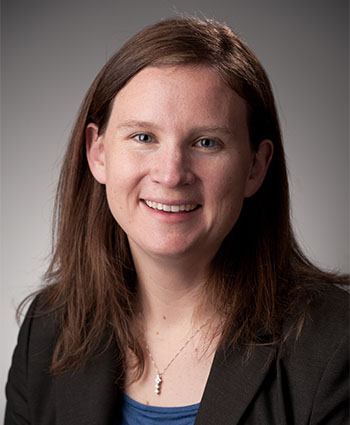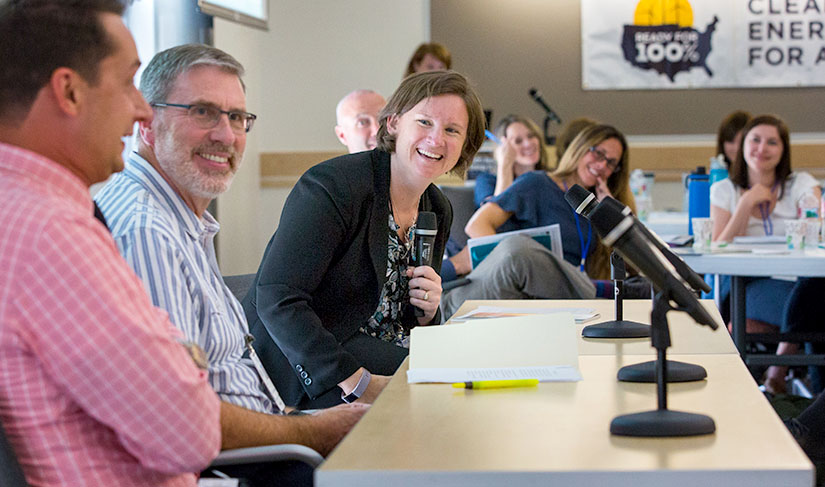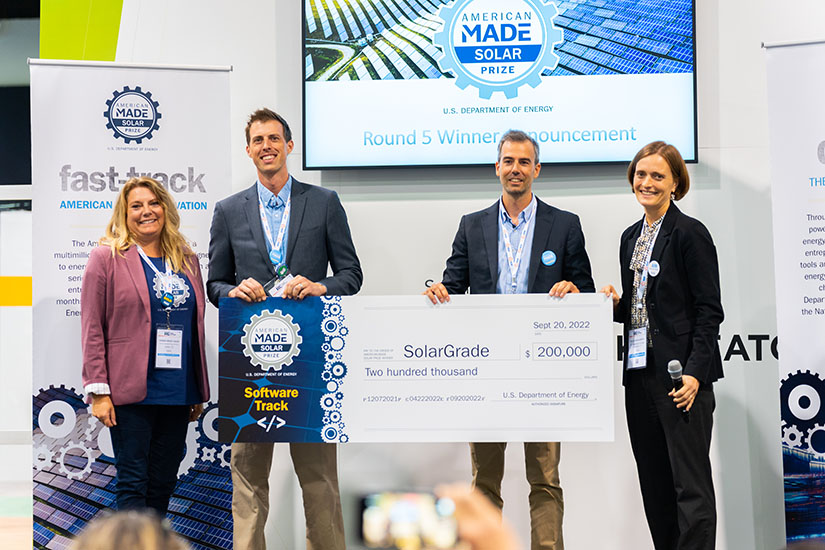Joint Institute for Strategic Energy Analysis Welcomes Elizabeth Doris as New Director
Crosscutting Institute Leverages NREL Research in New Ways To Address Emerging, Complex Challenges

Elizabeth Doris considers herself fortunate that she has fallen in love with some aspect of every job she has had, “even the really hard and challenging ones.” As someone who has built a thriving career at the intersection of technology and society, Doris is not just familiar with complex and crosscutting challenges—she actively seeks them out.
Doris has worked at the National Renewable Energy Laboratory (NREL) since 2005. She recently served as the laboratory program manager for NREL’s State, Local, and Tribal (SLT) Program. Doris has spearheaded several large initiatives at the laboratory, including the Energy Transitions Initiative Partnership Project to support remote, island, and islanded communities in transforming their energy systems and increasing energy resilience. Doris also served as the NREL lead of the National Laboratory Directors’ Council Community-Engaged Research initiative, a 17-laboratory group identifying areas where national laboratories can increase mission effectiveness through engaging communities. Most recently, Doris served as senior advisor within the U.S. Department of Energy (DOE) Office of Energy Efficiency and Renewable Energy (EERE).
Now, Doris’ pursuit to understand intersectional challenges has led her to a new role as director of the Joint Institute for Strategic Energy Analysis (JISEA). Founded by NREL and five universities, JISEA connects cross-sectoral partners to launch new research and solve complex energy problems. The institute’s innovative approaches provide researchers with the freedom and flexibility to overcome barriers created by legacy structures and siloed funding.
As Doris begins her new role, she explained how she sees JISEA as crucial to transforming everyday lives through the power of its clean energy research and partnerships.

Doris served as a panelist at the 2nd Annual North American Dialogue on 100% Renewable Energy in Cities conference at NREL in 2017. Photo by Werner Slocum, NREL
Were there any experiences in your childhood that planted the seed for your career?
"I was born in Vancouver, Canada, and my family immigrated to America when I was 3 years old. My mom is American, and my dad is Australian. Like so many immigrants, they brought with them a deep love for this country and the opportunities it provides. I got my interest in the public service aspect of science from them—their love for exploration and desire to make the world a better place."
What is a common thread among the most recent positions you have held: laboratory program manager of NREL's SLT Program, senior advisor within EERE, and now director of JISEA?
"When I joined NREL in 2005, a few of us were looking into how state policies and incentives influence the technology marketplace. Some folks wanted to focus exclusively on the technology, but I was hired to bring a more holistic approach to our tech development. In 2011, when I took the lead of the NREL Tribal Program after the amazing, late Roger Taylor, we started taking a critical look at how and what tribal governments needed en masse instead of responding to their individual questions. Concurrently, the technical assistance we were executing through the Recovery Act was at such a high volume that in addition to being responsive, we could take the requests as a data set and pivot to a proactive approach—driving research priorities through considering what people on the ground were asking about.
"By 2020, we had input from 2,000 communities. That work opened questions about how people’s lives were impacted by the technological changes. So, when I joined EERE, I took that community-focused knowledge with me. JISEA is a place where we can dig into these types of complex questions that will enable the clean energy economy. I’m excited to see how we—both JISEA and NREL—can work better together in support of our missions to make JISEA more valuable to both entities."
As you think about your vision for JISEA, what are you most excited about?
"When I think about the vision for JISEA, I think about how we can develop and scale JISEA capabilities for NREL to work on complex problems. How do we make it easier for scientists to both access and understand these challenges so that we can get these technologies into the marketplace? I’ve worked on complicated projects over the years where we’ve had to figure out institutional kinks, like having multiple funders who have different goals but are all focused on clean energy adoption. It’s difficult to get all of them aligned, but it’s possible. So, I want to explore how we can leverage JISEA, which already works across multiple partners, at the edge of research design. The goal is to be the best in the world at addressing the complex and hard problems for clean energy transformation.
"What’s exciting to me is the appetite people in the energy field have right now to try new things. As we’ve reached cost parity for a number of technologies and learned more about how to integrate technology into the marketplace through our deployment programs, we have discovered a whole new set of challenges that are both technological and social throughout the whole research-to-deployment continuum; for example, the challenges posed by an aging energy sector, or the infrastructure demands of population migration caused by climate change. I think JISEA can help answer those questions in an organized way."
How is JISEA uniquely poised to address the challenges that other institutions may struggle to address?
"JISEA serves as an incubator where we fund exploratory research and analysis that can position NREL as a leader in emerging research spaces. NREL has incredibly smart and talented principal investigators (PIs) and groups of PIs that are working on problems that increasingly require intersectional expertise. That’s where JISEA can contribute, while still respecting the work of the PIs. By breaking down information silos and enabling collaborative, interdisciplinary, objective research and analysis, JISEA draws the attention of a broad group of stakeholders.
"The JISEA Catalyzers program is a great example of this streamlining and amplifying effect. The Sustainable Communities Catalyzer brings JISEA and NREL researchers together to analyze and map sustainable social, economic, environmental, and land use pathways for clean energy transitions. This type of holistic, intersectional research with ultra-forward-looking strategic objectives can be absorbed into the larger NREL body of work to accelerate the transition to a clean energy economy. This catalyzer approach also enables JISEA to proactively anticipate the burdens and benefits of the future energy system and supports the design of more flexible, integrated, and democratic energy systems."

On Sept. 20, 2022, DOE announced five winners of the American-Made Solar Prize, including SolarGrade that is building a management platform to facilitate inspection, operations, and maintenance of PV systems leveraging field technician inputs and data analytics. Debbie Brodt-Giles (left) leads the American-Made program at NREL, which recently joined JISEA to elevate the visibility of prize work and amplify JISEA's complementary mission. Photo from Corcino Productions
One of the unique aspects of JISEA work is the funding mechanisms. Can you explain why that is so impactful?
"By removing some of the funding obstacles that researchers commonly experience, JISEA creates an incredibly agile environment where passion projects can blossom into reality. For example, through a JISEA consortia project, multiple funders can contribute to a research question of mutual interest. JISEA researchers then have flexibility and freedom to explore the question without the demands of traditional milestones and deliverables.
"Similarly, NREL’s American-Made program has created prizes (including collegiate competitions), vouchers, and a support network that is capable of advancing U.S. entrepreneurs and innovators with undiluted funding and resources to facilitate game-changing technical solutions, build community engagement, and bring in new innovators to the clean energy space. Competing prize teams have the freedom and flexibility to explore research questions while accessing the resources and expertise of the American-Made network. Rapid prize timelines and goals, quick funds dispersion, and more than 300 private-sector members, university partners, and national laboratories help teams fast-track product development timelines to accelerate the cycles of learning from years to months. I’m excited that NREL’s prize team recently joined JISEA to elevate their visibility and amplify their impact through JISEA's complementary mission."
What would you like folks to know about JISEA right now?
"JISEA is a crosscutting institution that is meant to leverage the amazing capabilities of NREL research centers in new ways to address emerging and more complex problems. I want JISEA’s staff to bring value to researchers at NREL by enabling more efficient, forward-looking research. And I want NREL folks to approach JISEA to see if they can explore research options through our partnerships."
Learn more about JISEA’s research and NREL's energy analysis research.
Note: The Joint Institute for Strategic Energy Analysis retired in February 2025. This article has been updated to reflect editorial changes made after its original publication.
Last Updated May 28, 2025
